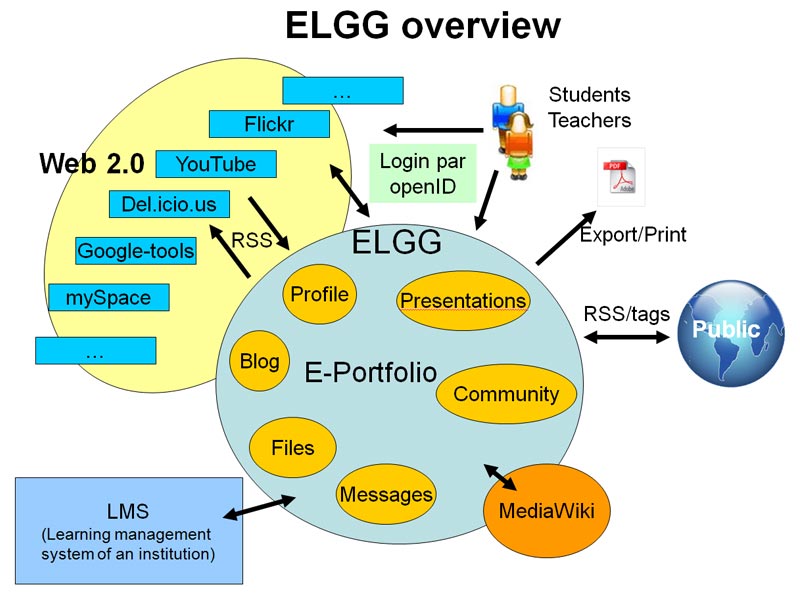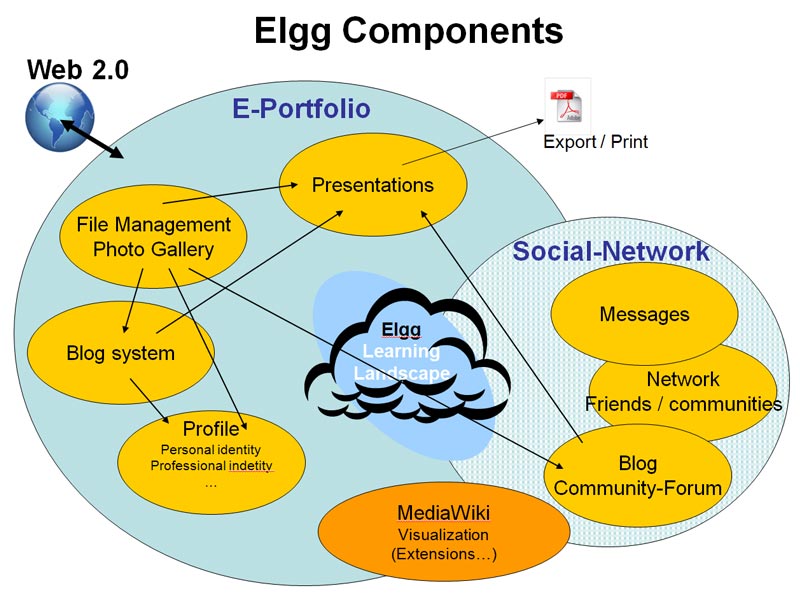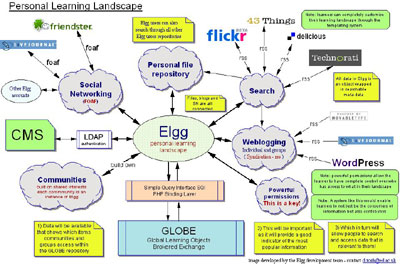ELGG
ELGG “is an open source rapid development framework for socially aware web applications. It is a great fit for building any app where users log in and share information.” (Elgg Documentation, retrieved April 2010).
ELGG is a social software system that has gained quite a lot of attention in the educational community. Elgg is an open source social networking platform developed for LAMP (Linux, Apache, MySQL, PHP) which encompasses weblogging, file storage, RSS aggregation, personal profiles, FOAF functionality and more.
In education it could be used for e-learning 2.0 scenarios and personal learning environments.
For more general information see the french article about Elgg.
Features
ELGG 3.x (as of April 2019) comes with a set of plugins that provide the basic functionality for your social network. The main documented plugins are the following.
- Blog: gallows for text-based notes to be published in reverse-chronological order, allows commenting
- Dashboard. This is a users portal to activity that is important to them both from within the site and from external sources. Using Elgg’s powerful widget API, it is possible to build widgets that pull out relevant content from within an Elgg powered site as well as grab information from third party sources. This is for private use and different from the Profile.
- Diagnostics, an administration tool
- File repository. Allows users to upload any kind of authorized file. Also includes a photo gallery.
- Groups: Flexible grouping tool. Includes a profile, forum, pages, message board and RSS feeds
- Messageboard: Similar to ‘The Wall’ in Facebook or a comment wall in other networks is a plugin that lets users put a messageboard widget on their profile. Other users can then post messages that will appear on the messageboard.
- Messages: Private "mail"
- Pages: create hierarchically-organized pages of text, and define reading and writing privileges.
- Profile: provides information about a user, which is configurable from the plugin’s start.php. One can change the available fields from the admin panel. Each profile field has its own access restriction, so users can choose exactly who can see each individual element.
- The Wire, witter-style microblogging plugin that allows users to post notes to the wire.
- User validation by e-mail
In addition, the default distribution includes the following ones that are not documented (as of April 2019): activity, bookmarks, ckeditor, custom_index, developers, discussions, embed, externalpages, friends, friends_collections, garbagecollector, invitefriends, likes, members, notifications, reportedcontent, search, site_notifications, system_log, tagcloud, web_services.
In addition, it is possible to install and configure about large number of additional plugins
History
(before 2007)
ELGG Environement
ELGG Environement
ELGG Roadmap 2007
(There is also a bigger picture, but it seems to be corrupted)
ELGG features include:
- Blogging
- Social networking
- File repositories for individuals and communities
- Podcast support
- Full access controls
- Supports tagging
- User profiles
- Full RSS support
- RSS aggregator
- Create communities
- Collaborative community blogs
- Create 'friends' networks
- Import content
- Publish to blog
- Multilingual
- Branding/customisation
The elgg-developer-community is growing. A lot of additional plugins (modules) are available in the elgg-plugin-repository: some examples:
- MediaWiki-Integration
- Presentations
- Blog-Categories
- Messages
- Activity-overview
- Ajax-Drag-and-Drop for widgets
....
OpenID
The development of an openID-Login for user-centric Digital identity is comming.
e-Portfolio
By using the combination of all these features users are able to build up dynamic, plat-form-crossing e-Portfolios.
References and links
- Richle, U., Schneider, D., Betrancourt, M. & Gavota, M. (2008). Social Software in the Context of Vocational Training. In Proceedings of World Conference on Educational Multimedia, Hypermedia and Telecommunications 2008 (pp. 1329-1340). Chesapeake, VA: AACE. Abstract/PDF Daniel K. Schneider and colleague's own little experience with ELGG.
- O'Hear, Steve (2006). Elgg - social network software for education, Read/Write web, HTML
- Wageneder, Günter / Jadin, Tanja. eLearning2.0 - Neue Lehr/Lernkultur mit Social Software? HTML
- eduspaces.net. Virtual space for educators created with ELGG.
- This video gives a short introduction to some of the basic features.
- Caro-Alvaro, S., Garcia-Lopez, E., Garcia-Cabot, A., de-Marcos, L., & Martinez-Herraiz, J. (2017). Development of a Social Gamified Platform for e-Learning. In Paspallis, N., Raspopoulos, M. Barry, M. Lang, H. Linger, & C. Schneider (Eds.), Information Systems Development: Advances in Methods, Tools and Management (ISD2017 Proceedings). Larnaca, Cyprus: University of Central Lancashire Cyprus. ISBN: 978-9963-2288-3-6. http://aisel.aisnet.org/isd2014/proceedings2017/Education/2.
- Thoms, Brian and Evren Eryilmaz. 2018. Social Software Design To Facilitate Service-learning In Interdisciplinary Computer Science Courses. In Proceedings of the 49th ACM Technical Symposium on Computer Science Education (SIGCSE '18). ACM, New York, NY, USA, 497-502. DOI: https://doi.org/10.1145/3159450.3159572
See also
- Explode is a social search tool that lets you find others online irrespective of which network they are on - managed over OpenID as it's planned for Elgg


